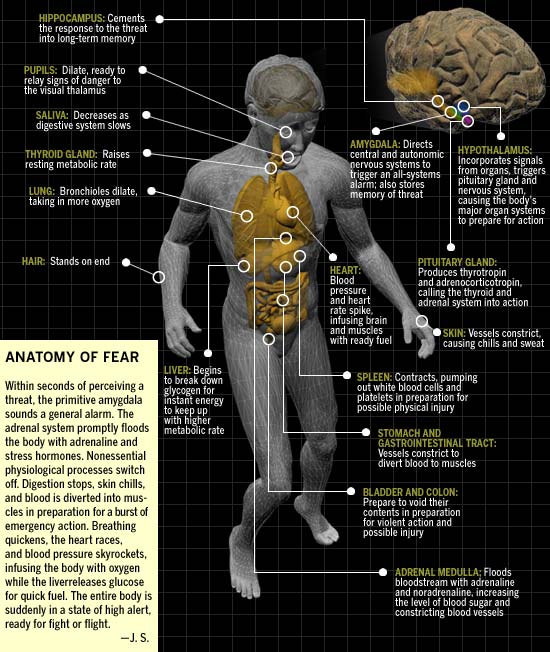There’s debate in the industry as to whether innate survival-skill mechanisms are just as or far more important than most training that one can undergo. Actually, maybe it’s just me that’s debating it, as I often run into huge defensiveness, protectiveness, and resistance to the idea. And, to be clear, that top professional training that reinforces evolution, intrinsic survival-skills, and natural-instinctive response, I believe can authentically help. But, as I’ve stated countless times online, people survive the world over (daily) with their Evolution-given tools. Even when survivor/victim claims of past or current martial arts experience aiding in that survival, we often see it being almost completely anecdotal to the actuality, taking a very secondary role to instinctive-response to threat.
As we’ve noticed on the page for years, most people look truly awful when fighting. We see it on Youtube and in case study and on home-video…people, even trained people, look like fish out of water when fighting. Uncoordinated. Awkward. Flailing. Imbalanced. Entirely normal. Even highly-trained, reputable fighters, when put under the pressures of adrenaline, cycle. They repeat the same move over-and-over again. They loop. The good ones loop/cycle successfully and know how to make it work but little in the way of martial arts is present. That being said, people, while often looking awkward and uncoordinated and flailing while fighting, often tend to instinctively do just the thing that’s needed when surviving. They react much more efficiently, with purpose, and decisively when their very survival is hanging in the balance. (See System 1 vs. System 2 article that might at least partially explain this).
While I have little interest in opening this up for debate, as it’s admittedly my theory….but one that I’d say has more than a little validity from volumes of case studies….the question is whether knowledge of these innate survival tools can be incorporated into a training environment. I’m not entirely sure to what extent but it is a question worth discussing. That being said, I’d say it would be entirely useful to understand, learn about, and study how these survival skills work from a scientific perspective. Knowledge begets clarity and alleviates fear of the unknown and panic at their onset. I’m going to transfer the file from The Human Protection Collaborative page here. Maybe more civilians and citizens and normal everyday people will read it than set-in-their-ways professionals did. It’s a big database, unlike any I’ve seen previous, compiled on stories, case studies, science-based explanation on how the body works under duress. Worth the time investment, it was for me…

Flinch reflex: https://www.wayofleastresistance.net/2011/03/flinch-reflex.html
Saccades: https://www.youtube.com/watch?v=D_y56PQvZZA
Sound-encoding by human brain: http://debuglies.com/2017/11/13/the-brain-encodes-sounds/
Anatomy of Intuition: https://www.psychologytoday.com/intl/articles/199305/the-anatomy-intuition
Visual recognition: http://debuglies.com/2017/09/20/identified-signals-not-entirely-visible/
Visual recognition:
https://neurosciencenews.com/neuroscience-terms/visual-recognition/
Amygdala/fear-learning: https://www.inverse.com/article/37657-amygdala-brain-fear-aversive-learning
Infection-detection:http://debuglies.com/2018/01/03/humans-identify-infected-peers-from-photo/
Stress adaptation: https://www.medicalnewstoday.com/articles/320172.php
Pain perception: https://www.ucalgary.ca/pip369/mod7/tempain/theories
Effects of corticol release: https://www.facebook.com/ashtad.rustomji/posts/1700278030031872?hc_location=ufi

Evolutionary psychology of war: https://journals.sagepub.com/doi/full/10.1177/1474704917742720
Human anger:https://www.pnas.org/content/106/35/15073.short
Memories can pass between generations through DNA: https://www.facebook.com/watch/?v=1319435594855362
Object-size perception and light reflext:https://www.ncbi.nlm.nih.gov/pmc/articles/PMC5133426/
Lost survival skills: https://io9.gizmodo.com/here-are-some-essential-survival-skills-weve-lost-from-1732594841h
Personal space: https://neurosciencenews.com/personal-space-9283/
Brain biases: https://www.psychologytoday.com/us/articles/200306/our-brains-negative-bias
Flat-footed fighters: https://www.sciencedaily.com/releases/2017/02/170215084113.htm
Propioception/low-light: https://renovahandcare.com/spooky-phenomenon-invisible-hands/
https://www.sciencedaily.com/releases/2018/06/180628120111.htm
Energy-conservation: http://time.com/4027942/lazy-walking-exercise/
Gut feelings/senses: https://neurosciencenews.com/hard-wired-gut-sense-9897/
Fear: http://debuglies.com/2018/10/30/psychologists-examine-why-haunted-houses-creep-us-out/
When humans were prey: https://www.youtube.com/watch?v=G_hl804lSfc
Mind-talk:https://marketbusinessnews.com/brain-learns-ai-development/193035/
Evolutionary directional sense: https://www.psychologytoday.com/us/blog/talking-apes/201806/why-only-some-people-have-great-sense-directionh
Pain tolerance & threshold: https://www.physiology.org/doi/full/10.1152/jn.00457.2012
Your brain is not a computer:
https://aeon.co/essays/your-brain-does-not-process-information-and-it-is-not-a-computer
https://horizon-magazine.eu/article/hand-gestures-point-towards-origins-language.html?fbclid=IwAR3_L7gUv-tmjdoYdWL2MkRBtPcrsWrVyfAsQiv1fBwGKbvbx438lfMGA74 (hand-gestures and visual communication)

Great resources. Overall.
Thanks, it seems to me you were one that contributed to that list, if I’m not mistaken…
從英超、西甲、德甲到中超,全球各大足球聯盟的7m足球運用大數據AI分析引擎即時比分都在這裡。
Penalty saves, goalkeepers who excel at stopping spot kicks
https://askoff.ru
landlords protection insurance [url=https://otvetnow.ru]https://otvetnow.ru[/url] san francisco nursing programs
asklong.ru
What i don’t understood is in fact how you are not actually much more neatly-favored than you might be now. You’re very intelligent. You realize therefore considerably with regards to this subject, produced me in my view consider it from so many various angles. Its like women and men are not interested except it’s one thing to accomplish with Girl gaga! Your own stuffs great. All the time deal with it up!
https://xrsaugpsya.wordpress.com
https://cxadxqpked.wordpress.com
https://akiwdiycje.wordpress.com
https://iqakruyprf.wordpress.com
https://wryxvrrhxe.wordpress.com
Hi there it’s me, I am also visiting this web site regularly, this site is genuinely good and the people are in fact sharing good thoughts.
超人和露易斯第三季高清完整版运用AI智能推荐算法,海外华人可免费观看最新热播剧集。
Hello, i feel that i saw you visited my web site thus i came to go back the favor?.I am trying to in finding things to improve my site!I guess its good enough to use a few of your concepts!!
爱一凡海外版,专为华人打造的高清视频平台AI深度学习内容匹配,支持全球加速观看。
愛壹帆海外版,專為華人打造的高清視頻官方認證平台,支持全球加速觀看。